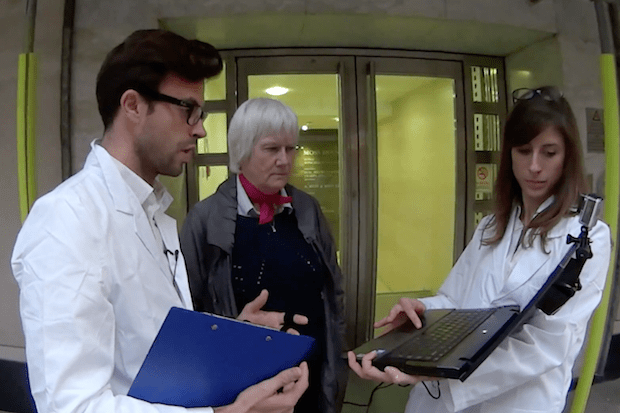What’s wrong with our politics? Now that more and people are turning to ‘anti-politics’ parties, this question is becoming steadily more fashionable and urgent. It’s now even got its own BBC Three documentary (the ultimate sign that an issue is dead serious, natch), called An Idiot’s Guide to Politics, presented by Jolyon Rubinstein from the Revolution Will Be Televised. The idea behind the programme was that Rubinstein would examine why people, particularly young adults, are so disengaged from politics and don’t want to vote, and why politics is in such a mess.
The picture Rubinstein presented was rather depressing for two reasons. The first was that politicians do break promises and this upsets voters, and politicians have to hustle to get enough money to campaign, which looks pretty dreadful from the outside. That is miserable, and the programme found plenty of people who were miserable about it. The second depressing thing was Rubinstein himself, prancing round various locations being rude to politicians and party apparatchiks, all the while suggesting that their baffled reactions — or, worse, the baffled reactions of their receptionists who had no more to do with the problems with politics than those watching — just underlined how out of touch Westminster politicians are.
Rubinstein, oddly, was out of touch with Westminster, in the sense that he didn’t really bother to examine it at all, other than driving round with a truck with a pile of ‘bullshit’ (which actually looked like rather good topsoil) and invading various party HQs (again to the consternation of the poor people working on reception rather than the scheming politicians upstairs, though the best bit of the programme was Nigel Farage managing to escape from the cameras by dressing up as a builder and scarpering through another entrance). What do MPs do? What happens in the House of Commons? If you have a problem, what will an MP’s office do for you? Do MPs even bother to turn up to debates? If you were at all curious, you’d be sorely disappointed by what an Idiot’s Guide to Politics offered. It barely guided you at all.
The programme also implied that there was little keeping MPs from lying or breaking their promises. Perhaps Rubinstein was assuming that the ‘Facebook generation’ haven’t noticed the way the Opposition in every parliament tries to highlight the failings of the government. Or how the press does something far more annoying than prancing round in fancy dress and instead scrutinises the claims that politicians make, exposes their dodgy dealings and analyses their successes and failures. Some journalists happily write up dodgy statistics from party HQs, but more often they enjoy producing annoying graphs that explain what’s really going on.
There were some flashes of insight. Zac Goldsmith is a Tory MP who thinks deeply about the problems with parliament and how to improve democracy. Many may disagree with his Recall Bill, but few can claim he’s not trying to improve public trust in Parliament. His interview with Rubinstein was excellent but too short. The communications director of Change.org also made an important point that politics can change when people get involved in it through voting and campaigning.
But even the problems that Rubinstein examined in some detail were often left hanging without any suggestion of a solution. Could party fundraising activities become cleaner? And why aren’t politicians doing anything about it? The programme didn’t look at state funding of political parties, or indeed whether voters even want state funding of political parties. Soon it became an extended advert for Rubinstein’s petition on change.org, which demands that politicians ‘make lying in Parliament history’. The page taking signatures (currently 117,000) points out that it’s entirely legal for an MP to lie to Parliament but not for someone to lie on oath in a court of law. Then it says this:
‘I’m not launching it as part of a campaign to have this law passed. I want to start a debate about the importance of the truth in politics. If enough of you sign, it will send a message that we have had enough of broken promises, massaged statistics and the double speak we feel we’ve been subjected to over the years. Today, less than 1 in 4 people trust MPs. This can’t go on.’
The campaign that is ultimately not campaigning for anything is spreading through the hashtag #makelyinghistory. Rubinstein might as well be promoting a petition entitled ‘Make Human Nature Different’. Politicians lie. So do television presenters, the people who watch the programmes, lawyers, teachers, doctors, nurses and even vicars (yes, even vicars). People break promises to one another the whole time: parents to their children, spouses to the person they married and friends to those who rely on them most. That’s not to excuse the behaviour, but it is rather odd that we hold politicians to standards that most of us break the whole time.
What doesn’t have to happen the whole time is the sort of behaviour encouraged by a political system where patronage stops proper scrutiny of legislation, where tribalism stops governments accepting they got a policy badly wrong, or where MPs can be as lazy as dogs because they’ve been elected to a safe seat that would never turf out a Tory or let go of a Labourite. But Rubinstein didn’t look at any of those corrosive forces in our politics. Presumably he thought the hardworking, clean-living bunch of young should-be voters he dubbed rather patronisingly as the ‘Facebook generation’ wouldn’t share a programme like that.







Comments